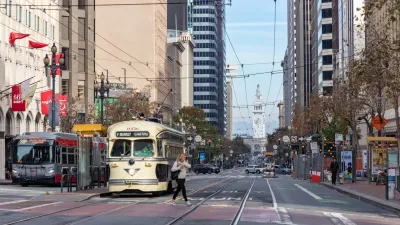Rachel Gordon reports on San Francisco's "aggressive plan to install thousands more parking meters and to expand the hours they operate," which has drivers fuming.
By targeting its parking policies "to encourage travel by public transit and sustainable modes of transportation," as outlined in a new San Francisco Municipal Transportation Agency document mapping out the city's parking management strategy, planners and officials are upholding the city's transit-first policy that has been in place for nearly four decades and reaffirmed by voters in 1999, 2007 and 2010. But this hasn't stopped the city's automobile users from speaking out. According to Gordon, "Some drivers in the city feel unfairly targeted and protective of the dwindling perks they have left."
"'People are really ready to fight back. The city is just going too far,' said Mari Eliza, who lives and works in the northeast Mission and is an organizer with the advocacy group ENUF, Eastern Neighborhoods United Front, that helped persuade the city to slow down the planned implementation of new meters in their area."
"She said taking transit, biking and walking is not for everyone. She, for one, doesn't feel safe taking Muni or BART at night," notes Gordon.
"Jay Primus, who runs the city's SFpark program, agrees that alternatives to driving are not an option for all. 'Transit first is not anticar,' he said."
"He noted that the city is working to find a better balance so drivers, cyclists and pedestrians can benefit. But he also argues that the parking program that manages availability by demand-based pricing helps reduce the amount of time drivers circle a block looking for a space, reducing congestion, greenhouse-gas emissions and frustration behind the wheel."
The parking management strategy is scheduled to be considered by the Transportation Agency's governing board on Sept. 18.
FULL STORY: SF parking plan's message: Transit first

Alabama: Trump Terminates Settlements for Black Communities Harmed By Raw Sewage
Trump deemed the landmark civil rights agreement “illegal DEI and environmental justice policy.”

Planetizen Federal Action Tracker
A weekly monitor of how Trump’s orders and actions are impacting planners and planning in America.

Why Should We Subsidize Public Transportation?
Many public transit agencies face financial stress due to rising costs, declining fare revenue, and declining subsidies. Transit advocates must provide a strong business case for increasing public transit funding.

How Housing as a Financial Product Harms Communities
Institutional buyers who treat housing as an investment product become disconnected from the impacts of higher rents, displacement, and housing instability.

Blinded by the Light: When Brighter Headlights Decrease Safety
Bright LED headlights can create glare and reduce visibility for other drivers and pedestrians.

Study Links Covid and Poor Driving
The effects of the virus, including ‘brain fog,’ can make driving more difficult and dangerous.
Urban Design for Planners 1: Software Tools
This six-course series explores essential urban design concepts using open source software and equips planners with the tools they need to participate fully in the urban design process.
Planning for Universal Design
Learn the tools for implementing Universal Design in planning regulations.
Caltrans
Smith Gee Studio
Institute for Housing and Urban Development Studies (IHS)
City of Grandview
Harvard GSD Executive Education
Toledo-Lucas County Plan Commissions
Salt Lake City
NYU Wagner Graduate School of Public Service



























